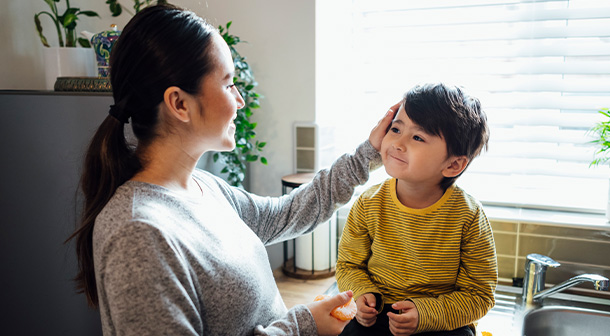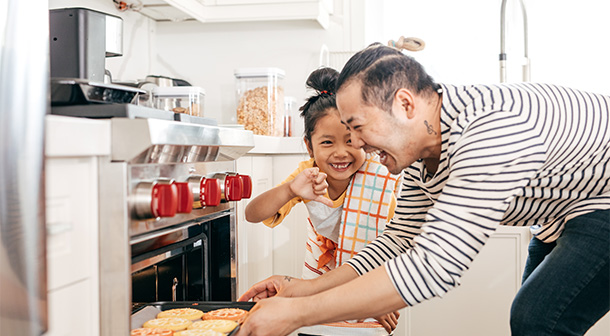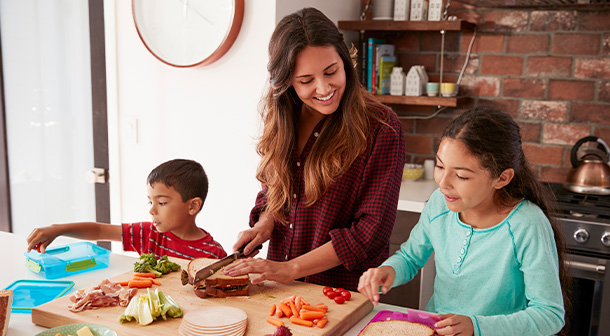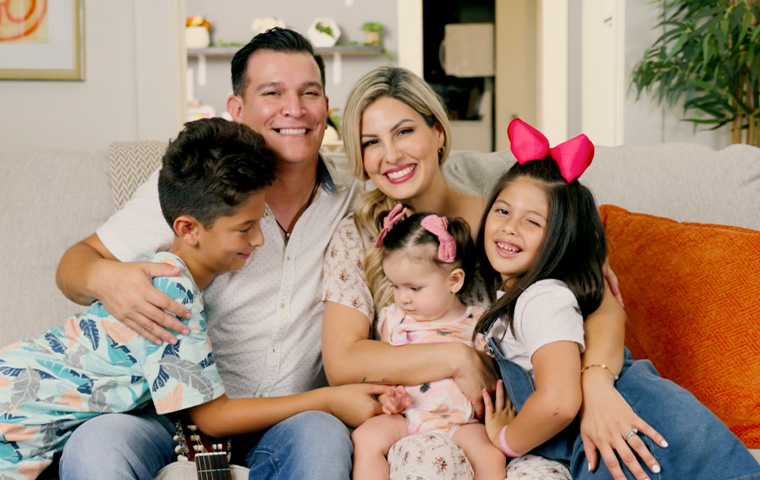5 Steps to a Healthier Parent-Child Relationship
By GetParentingTips.com staff
Read Time: 7 Minutes
The Importance of Your Parent-Child Relationship
Every parent wants to have a close and strong relationship with their child but juggling the demands of work and managing a household can sometimes make it difficult to build and maintain family bonds. Here are some suggestions on ways to build a healthier parent-child relationship.
A healthy parent-child relationship teaches your child:
- That he (or she) is safe, secure, and loved.
- How to manage his feelings with confidence.
- What a healthy relationship should look and feel like.
- That he can approach the world with openness and enthusiasm.
- How to develop healthy relationships with friends, future partners, and possibly his own children one day.
Your parent-child relationship is being formed from the moment your child is born. Responding when he cries, feeding him when he’s hungry, comforting him when he’s hurting, and laughing with him when you play together all build a foundation for what child development experts call “secure attachment.” Secure attachment gives a child a sense of well-being and safety. Children who are securely attached to their parents have a healthy parent-child relationship and are better equipped to cope with challenges such as stress, family trauma, and depression.

Be the Adult You Want Your Child to Grow Up to Be
What helps your child become a kind, self-aware, and compassionate person who develops healthy relationships with others? Seeing you model kindness, self-awareness, and compassion. Sometimes it’s easy. Sometimes it’s hard. But it will always be worth it.
Building a positive parent-child relationship early on will be the foundation for how your child experiences the world. Your dedication now to building that relationship will benefit your child throughout his life.
How do I assess my Parent-Child Relationship?
- Do you and your child always seem to be struggling with each other?
- Does he become angry with you easily?
- Does he feel you treat him unfairly?
- Does he see you as a source of punishment?
- Does he feel hurt when you spend time with another child?
- Does he remain angry after he is disciplined?
- Does dealing with your child drain your energy?
- Do you have a bad day when he is in a bad mood?
- Are his feelings toward you unpredictable?
- Are you uncomfortable with how you and your child get along?
- Does he whine when he wants something?
- Do you feel he is sneaky or manipulative?
If you answer yes to many of the above questions, don’t worry. There are likely things you can do to strengthen your relationship! Don’t just settle for a difficult parent-child relationship. You and your child deserve better, and there are ways to work through the issues that are causing problems. It’s okay to ask for help from your pediatrician, a counselor, or a local parenting support program. Remember, this is the time that your child is learning how to be in relationships with others. He learns from his relationship with his parents. So, teaching him positive ways to build healthy relationships not only helps him now but for the rest of his life. Keep reading to learn some tips for developing a strong parent-child relationship!
Need parenting help now?
The Texas Parent Helpline is available 24/7.
- Call 833-680-0611
- Chat with us
- Text 833-680-0611
How Close Is Your Parent-Child Relationship?
Answer yes or no to the following statements to determine how close your parent-child relationship is. The more you agree with the statements, the higher you rank in having a close parent-child relationship.
- I have an affectionate relationship with my child.
- My child seeks comfort from me when he is upset.
- My child values his relationship with me.
- My child beams with pride when he is praised.
- My child spontaneously shares information with me.
- My child tries to please me.
- It is easy to be in tune with what my child is feeling.
- My child copies my behavior.
- My child openly shares his feelings with me.
- Interactions with my child make me feel effective and confident as a parent.

5 Tips for Developing a Strong Parent-Child Relationship
Building any relationship takes work, and your parent-child relationship is no different and is one of the most critical ones that you’ll ever form. Below are ways to help you and your child create meaningful bonds now and for years to come.
Encourage Open Communication
Let your child know that he can always come to you for help. This can be as simple as just listening to a problem he’s facing or helping him solve something he’s struggling with. You don’t have to have all the answers—just being present and available shows him that you value your parent-child relationship and that you’re there when he needs you. If your child wants to talk, try to stop what you’re doing and be present, even if you’re in the middle of something. By getting your full attention, your child will know that he can come to you for help and you’ll make him a priority.
Listen and Empathize
As parents, we may think we have all the answers to our children’s problems. But often what children need is a just listening ear and to be reminded they’re not alone. You may not really understand what your child is feeling, but do your best to be empathetic. Empathy is simply connecting to another person’s emotions. You don’t have to feel sorry for your child, but instead acknowledge that his feelings are valid. We all want to know that our feelings matter and that someone cares, and what better person than a parent?
Make Time to Connect
Try to check in with your child for 10 minutes every day. If you have more than one child, make it a priority to spend 10 minutes a day with each one. If you can make it longer, even better. The key is to provide one-on-one time so that he knows he’s a priority. Bedtime is great for giving your child the opportunity to share anything he might want to talk about. You might also try giving everyone in your family the opportunity to share their highs and lows of the day at dinnertime. Carving out time every day to connect, listen, and empathize will build your parent-child relationship little by little.
Consider scheduling a special “date” with your child for some one-on-one bonding. It could be as simple as a bike ride or a trip to the bakery for a treat. You don’t always have to be the one to do the planning—letting your child plan it is a great way to show you care about and respect his interests. Whatever you do together, your child will love having your full attention and your parent-child relationship will benefit from the time you spend together.

How Best to Deal with Big Emotions
It’s unavoidable. Sometimes your child will feel angry, sad, frustrated, or some other negative emotion. It’s difficult to watch him struggle and experience pain but helping him learn how to handle these emotions will help build your parent-child relationship and the relationships he has with others.
Identify Your Feelings.
When you name your feelings, your child learns how to identify those same feelings when he experiences them. You can say things like, I’m frustrated that I burned the pancakes. I’m angry that traffic is so bad and now we’re going to be late for soccer practice. I am excited for grandma to come visit! I am nervous about a presentation I have to give at work.
Show Healthy Ways to Deal with Feelings.
You can teach your child to draw a picture or write in a journal as a way to vent when he’s upset or sad. You can explain that when you feel nervous, you close your eyes and take deep breaths, and it makes you feel better. The goal is to raise a child who can regulate his feelings, knows how to ask for help when he needs it, and doesn’t fall apart when life gets hard. These skills will help him develop healthy relationships for the rest of his life.
Normalize Having Big Feelings.
Everyone has big feelings. By identifying your feelings and showing healthy ways to deal with them, you are teaching your child that it’s normal and okay to feel all kinds of feelings. It’s how you respond to them that is important. Throwing a fit, hurting someone else’s feelings, and lashing out are not good ways to cope with big feelings. Modeling the right ways to respond will help your child have a stronger and more peaceful parent-child relationship and healthier relationships with others in his life.
Say "I Love You" Often
This one is key to building a healthy parent-child relationship! It is often implied that we love our children, but be sure to tell them every day, no matter what age they are. Make it a priority to give your child a gentle, loving touch (such as a hug) every day, several times a day.
This one may seem obvious – but remember that smiling and making eye contact are physical reminders that you care. It sounds like such a simple thing, but sometimes our actions can be as important as our words. It’s these small, daily things that build your parent-child relationship.
Relationships can vary with each child, so what works for one may not work for another. Keep trying and find the right approach for working on each parent-child relationship.

Be Kind to Yourself
You are your child’s model for how to do pretty much everything in life. That sounds like a lot of pressure but it doesn’t mean you have to do everything perfectly.
We may have an image of the perfect parent-child relationship in our mind and wonder if we’ll ever measure up to that ideal. It may be tempting to compare yourself to other parents and wonder whether you’re doing enough to build your healthy parent-child relationship. This is completely normal, but it’s okay to give yourself a little grace and remember that no one can be a perfect parent 100% of the time. The good news is that even when you aren’t at your best, your child has an opportunity to watch you and learn how to respond in healthy ways.
What matters most when it comes to nurturing your parent-child relationship is that you try to do the best you can. Taking small steps to connect, be present, listen, and show your child how much you love him will add up to a happy, healthy parent-child relationship and a happy, healthy child.




